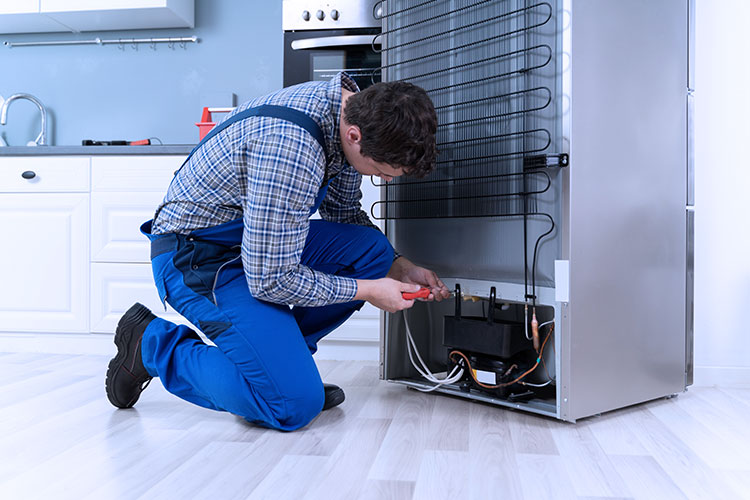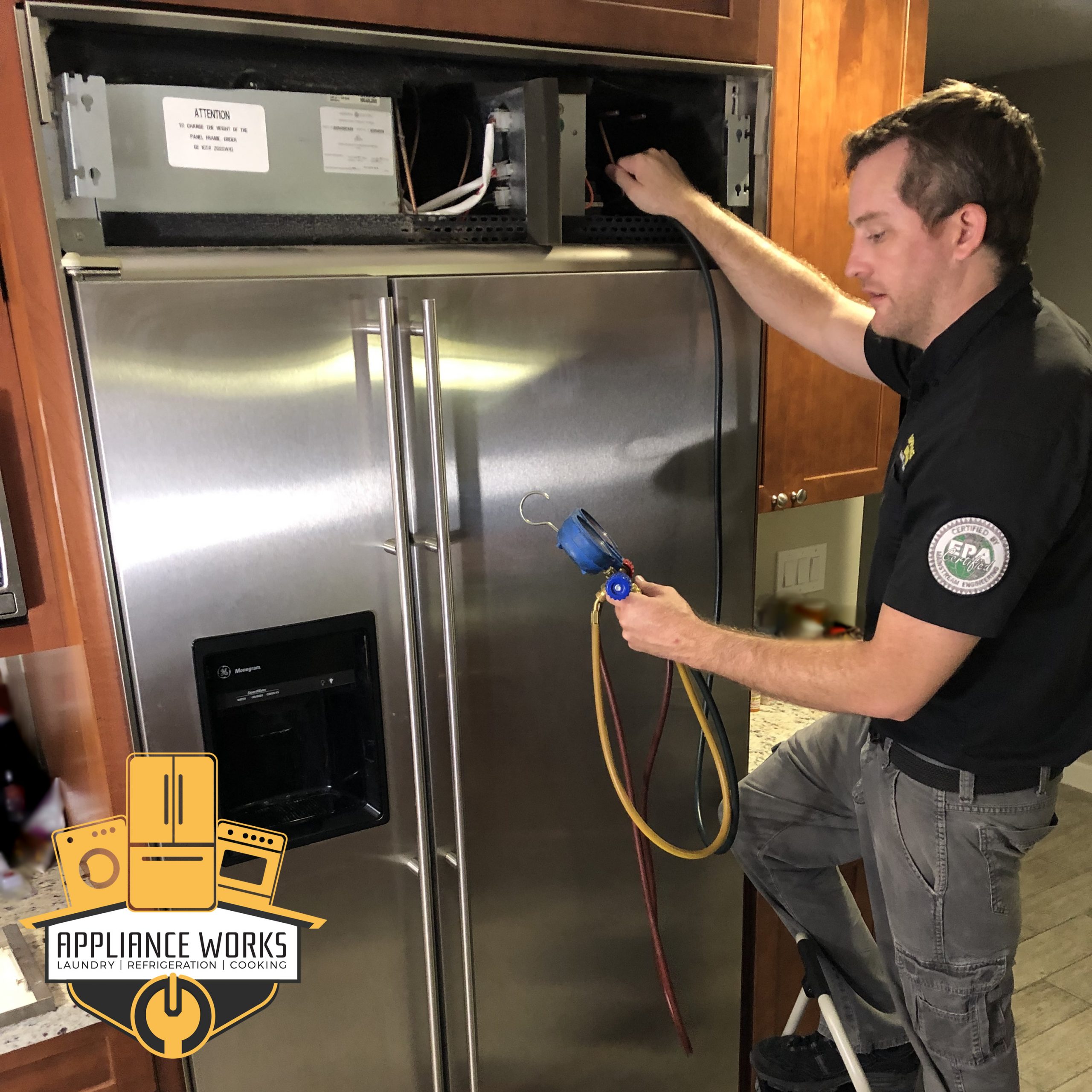Why Refrigerator repair experts Dependable Refrigeration & Appliance Repair Say Energy Spikes Could Mean a Failing Fridge
Why Refrigerator repair experts Dependable Refrigeration & Appliance Repair Say Energy Spikes Could Mean a Failing Fridge
Blog Article
Vital Tips for Effective Ref Fixing to Expand Device Life Expectancy
When it comes to your fridge, proper repair and upkeep are important for longevity. Comprehending common issues and knowing when to act can make all the distinction.
Understanding Usual Refrigerator Troubles
Fridges are essential in keeping your food fresh, but they can run into an array of common troubles that interrupt their efficiency. If you see food ruining quicker than typical, inspect the thermostat setups or think about if the door seals are harmed. Acknowledging these problems early can conserve you time and cash in repair services, ensuring your refrigerator runs smoothly and effectively.
Routine Maintenance Practices
To maintain your devices running efficiently, you require to remain on top of regular upkeep practices. Clean the condenser coils, check the door seals, and check the temperature level setups to guarantee peak efficiency. These basic jobs can conserve you money and time on repairs down the line.
Clean Condenser Coils Consistently
Cleaning your condenser coils on a regular basis can considerably improve your home appliance's effectiveness. Dust and dust accumulate on these coils gradually, triggering your appliance to function tougher and eat more power. To keep them clean, disconnect your device and thoroughly remove any type of safety covers. Use a vacuum with a brush add-on or a soft brush to carefully eliminate particles. If required, a mixture of cozy water and mild detergent can help eliminate persistent grime. See to it to allow everything dry totally before rebuilding and connecting the device back in. Goal to clean your coils a minimum of two times a year, or extra frequently if you have animals or reside in a dirty atmosphere. This easy job can prolong the life expectancy of your home appliance significantly.
Examine Door Seals
Three simple steps can aid you assure your appliance's door seals remain in great problem. Initially, inspect the seals on a regular basis for any cracks, rips, or signs of wear. These damages can cause air leakages, affecting effectiveness. Second, tidy the seals making use of warm, soapy water to eliminate any type of debris or gunk. A tidy seal assures a limited fit and far better efficiency. Lastly, do a simple test by closing the door on an item of paper. If you can easily draw it out without resistance, the seal may require replacing. By following these actions, you'll maintain your appliance's effectiveness and long life, saving you cash on power costs and fixings in the long run.
Screen Temperature Level Settings
Regularly checking your appliance's temperature level settings is vital for finest performance and effectiveness. Make use of a thermostat to check these settings consistently, particularly after major adjustments, like relocating your appliance or changing the thermostat. By staying positive regarding temperature level tracking, you'll ensure your appliances run smoothly and last much longer.
Troubleshooting Air Conditioning Issues
When your fridge isn't cooling correctly, it can lead to ruined food and threw away money, so resolving the issue promptly is critical. Begin by examining the temperature settings to confirm they go to the advised degrees, usually around 37 ° F for the refrigerator and 0 ° F for the fridge freezer. If the setups are right, inspect the door seals for any kind of spaces or damages; a defective seal can enable warm air to enter.
Examine the condenser coils, normally located at the back or bottom of the device. Clean them with a vacuum cleaner or brush to enhance efficiency. If problems continue, it might be time to call a professional.
Dealing With Water Leak and Ice Accumulation
If you're handling water leak or ice build-up in your device, it's important to determine the resource of the issue. By determining where the water is originating from, you can avoid further problems and stay clear of expensive repair services. Let's discover some efficient strategies to take on these typical problems.
Recognize Leakage Resources
How can you successfully identify the sources of water leakage and ice build-up in your devices? Start by evaluating the seals and gaskets on your refrigerator and fridge freezer doors. A used or broken seal can permit warm air to enter, triggering condensation and ice. Next off, check the drainpipe frying pan and drain system for obstructions or clogs; a backed-up drainpipe can lead to water merging. Search for any kind of loosened connections in the water system line, which can create leakages. Take a look at the defrost drainpipe for ice build-up, which could interrupt appropriate drain. By systematically checking these areas, you'll pinpoint the source of the issue, permitting you to take the essential actions to fix it and extend your home appliance's life expectancy.
Prevent Ice Development
To stop ice formation in your home appliances, beginning by validating the temperature site web level settings are ideal. If your fridge or freezer is as well cool, it can result in too much ice build-up. Inspect the door seals routinely; harmed seals can allow warm air in, creating condensation and ice formation.
Maintain the device well-ventilated and stay clear of congestion, as this can block airflow - Appliance Repair Oro Valley Dependable Appliance Services. Consistently defrost your freezer if it doesn't have an automated defrost function.
If you notice water leakage, recognize and take care of any type of blocked drain openings, as they can contribute to ice build-up. Lastly, tidy the coils and confirm they're operating properly to maintain peak efficiency. Taking these steps will assist extend your appliance's life-span and performance.
Addressing Noisy Fridge Appears
While it could seem worrying, a noisy refrigerator commonly signifies minor issues rather than major malfunctions. Usual culprits include the compressor, fans, and water lines.
Following, examine for loosened products inside. Often, containers or shelves can rattle, developing unwanted sound. Tighten up or reposition them to remove the noises.
If you notice a clicking noise, it may be the defrost timer. This is commonly safe however might show it requires examination.
Lastly, confirm your refrigerator is level. An unbalanced home appliance can create vibrations and sound. Use a degree to inspect, and readjust the feet if needed. Addressing these problems immediately can help preserve your fridge's efficiency and extend its life-span.
When to Replace Components vs. Full Replacement

Take into consideration the expense of fixings versus the device's value. Additionally, if you observe ongoing problems that maintain recurring, it's an indicator that your home appliance has gotten to the end of its life.
Recognizing When to Call a Specialist
Exactly how can you inform when it's time to call in an expert for home appliance fixing? If your appliance quits functioning completely or frequently journeys circuit breakers, it's an additional red flag.
You should likewise consider your very own convenience level with fixings. If you're uncertain concerning identifying the issue or lack the right devices, it's ideal to get to out for aid. find Keep in mind, attempting difficult fixings can lead to more damages or perhaps safety risks.

Regularly Asked Concerns
Exactly how Commonly Should I Clean the Fridge Coils?
You must clean your refrigerator coils every six months. This assists maintain performance and avoids overheating. If you notice too her response much dust or pet dog hair, tidy them extra often to guarantee your fridge runs efficiently.

Can I Use Vinegar for Cleaning My Refrigerator?
Yes, you can make use of vinegar to cleanse your fridge! It's a superb natural cleaner that removes odors and stains. Refrigerator repair experts Dependable Refrigeration & Appliance Repair. Simply mix it with water, apply it to surface areas, and clean down for a fresh, tidy fridge
What Temperature Should My Fridge Be Ready To?
You must establish your fridge to 37 ° F(3 ° C) for perfect food conservation. This temperature level maintains your food fresh while preventing putridity, guaranteeing your groceries last longer and decreasing waste. It's a simple change you can make!
Does a Fridge Required to Be Leveled?
Yes, your fridge needs to be leveled. If it's unequal, it can impact cooling down performance and cause excess sound. Examine the progressing legs and adjust them to assure appropriate balance for excellent performance.
Exactly How Can I Minimize Refrigerator Power Usage?
To minimize your refrigerator's power intake, maintain it clean and well-ventilated, check door seals for leaks, set the temperature level in between 35-38 ° F, and stay clear of overloading it. These steps can considerably decrease your power costs.
Report this page